Lagos Travel Guide
One of the fastest growing cities in the world, Lagos is Nigeria's biggest, busiest city with a population of roughly 15 million, which was originally a small Yoruba settlement. Spread over the mainland near the Gulf of Guinea and several large islands on a vast lagoon, the city is Nigeria's principal port and its commercial and cultural centre.
The former capital grew to prominence when it became a central trading post for the Portuguese in the late 1400s, also serving as a major hub for the international slave trade. When the British annexed the city in 1861, they effectively put a stop to the slave trade but took control of trade and industry.
Once Nigeria gained independence in 1960, Lagos experienced a boom which swelled the city's population considerably. Today Lagos is home to a complex tapestry of religious and ethnic groups. The sprawling city is vibrant, crowded, and lacks any major tourism infrastructure, though the government is investing millions in upgrades to security and public transport.
Most visitors travel to Lagos for business and there are few tourist attractions in the city. However, those willing to put in some effort will have a unique and memorable experience. Streets are congested, drivers are maniacal and blackouts are common, but the complex history of the city, and Nigeria as a whole, contributes to its unique flavour. Lagos has an interesting National Museum, National Theatre, several colourful markets and some beautiful beaches to explore.
Things to do in Lagos
Lagos has a number of interesting museums, including the National Museum of Nigeria, the Didi Museum, the Nike Art Gallery, and the National Theatre of Arts and Culture.
For many travellers, the noise and bustle of the city's streets and markets will seem enough of a sightseeing adventure. Lekki Market is a great experience, and one of the best places to explore what city life in Lagos is all about.
After a few days in the city, many visitors may feel the need for some peace and quiet, and there are a number of great attractions within an hour's drive from central Lagos. There are several excellent beaches in the area, including Eleko Beach, Bar Beach, Elegushi, and Lekki Beach. Nearby beach resorts such as Hermitage Garden Resorts and La Campagne Tropicana on the Lekki Peninsula are worth a visit, as is the Lekki Conservation Centre. Finally, no trip to Lagos is complete without a visit to Sungbo's Eredo to see the largest pre-colonial construction Africa has to offer, or the ancient slave port of Badagary Town.
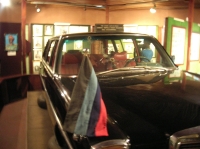
National Museum
Occupying prime position on Lagos Island in the centre of the city, the National Museum contains a number of treasures and cultural relics of great interest. Visitors should take their diary along to record the experience as photography is not allowed. Highlights include the exhibit 'Treasures of Ancient Nigeria: Legacy of Two Thousand Years', and the bullet-ridden black Mercedes in which former president Murtala Mohammed was assassinated in 1973. Also not be missed is the gallery of Benin brasses and the crafts village, where visitors can haggle for souvenirs.
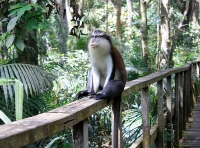
Lekki Conservation Centre
Situated on the Lekki Peninsula covering 190 acres (78 hectare), the Lekki Conservation Centre is perfect to experience the fauna and flora of this region's delicate ecosystems. Visitors can see Mona monkeys, crocodiles, bush bucks, Maxwell duikers, and giant rats, among other fascinating creatures. There are various trails and tree platforms to get the best vantage point. It's best to visit in the early morning when the animals are most active. Tours need to be booked in advance.
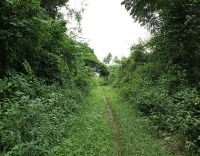
Sungbo's Eredo
Travellers should take a taxi one hour north of Lagos to see Sungbo's Eredo, Africa's largest pre-colonial construction, a sight rated by experts as an unknown 'Wonder of the World'. The Eredo is a rampart that is 1,050 years old, 100 miles (160km) long, and 70ft (20m) high. Locals will need to guide visitors in and out, as the structure is rapidly being covered by encroaching forest. The enigmatic Eredo has been linked to the myths and legends of various tribes and religions. According to the local Ijebu clan, the Eredo may have been built as a memorial to noblewoman Oloye Bilikisu Sungbo, a childless widow, whose grave is located nearby.
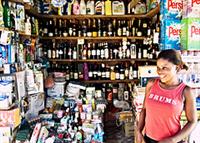
Lekki Market
For a taste of the real Lagos, travellers should head to the bustling, chaotic, and always fascinating Lekki Market. Intrepid shoppers that make the trip here will be rewarded with a wonderful selection of African masks, Nigerian beadwork, and traditional cloth. The Lekki Market is located about 6 miles (10km) from the centre of Victoria Island, and is a popular taxi route. Visitors should bargain hard but keep smiling and, for about NGN 50, they can get a local to help them navigate the market, which will be money well spent.
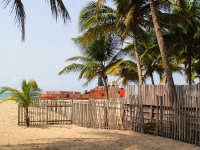
Eleko Beach
The best beach for Lagos-based visitors is Eleko Beach, located just one hour away from Nigeria's frenetic economic heartland. It's clean and peaceful, with perfect waves and beach huts for hire, and is currently free of the traders and hawkers that can irritate visitors on beaches around Lagos Island. Eleko Beach is a welcome relief from the grime and congestion of the metropolis. To get there, head out east on Lekki Expressway for about 19 miles (30km) and turn right at the petrol service station.
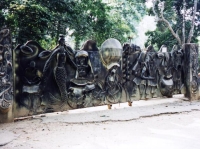
Osun-Osogbo
One of Nigeria's top tourist attractions and a UNESCO World Heritage Site, the Osun-Osogbo Sacred Grove holds a deeply special place in the hearts and minds of the Yoruba people. Located in the last remaining areas of pristine forest in southern Nigeria, the grove is said to be the home of Osun, the Yoruba goddess of fertility. Numerous shrines and sanctuaries have been built in honour of Osun, including sculptures done by Austrian national Suzanne Wenger who earned herself the local name Aduni Olosa, the 'Adored One'. If at all possible, travellers should time their visit to coincide with the Osun-Osogbo Festival (late July to August), a 12-day celebration of significant cultural interest.
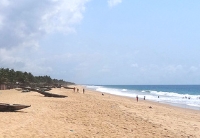
Lekki Beach Resort
A favourite among business travellers to Lagos and expatriates living in the area of Victoria Island, Lekki Beach Resort is a new establishment offering well-heeled tourists the opportunity to experience some refinement and luxury in the midst of the often chaotic and ramshackle city. Built along 1.6 miles (2.5km) of the pristine Lekki Beach shoreline, and covering an area of 157 hectares (388 acres), the Lekki Beach Resort is a major operation featuring luxury accommodation, including an 18-hole golf course designed by world-renowned golf course architect, Ron Garl, and a clubhouse with a fine restaurant and bar. There are also numerous family-oriented amenities, such as swimming pools, tennis courts, exercise rooms, and a health spa. Undoubtedly the premier place to play golf in Nigeria, the course is also quite a beautiful sight in its own right, blending seamlessly into its natural surroundings and boasting fantastic Atlantic Ocean views.
Eating Out
Whether visitors are business travellers or a sightseeing adventurers, the Lagos restaurant scene has something for everyone. Foodies will delight in the range of restaurants available. With choices ranging from local Nigerian fare to traditional Thai cuisine, diners will have a difficult time choosing between the many restaurants available in Lagos.
Nigerian food is genenrally rich and colourful, flavoured with spices and hot chilli peppers, and travellers looking for a taste of the local cuisine should try dishes such as jollof (rice cooked with tomato, onion, and pepper), akara (deep-fried bean cakes), banga (a palm fruit-based soup), or moin moin (a steamed bean pudding).
Eating out in Lagos offers not only variety in ethnic and foreign cuisine, but price and quality too, with a range of upmarket, casual, fast-food and street vendor options. Most trendy and reputable restaurants are located on Victoria and Lagos Islands and the Lekki Peninsula.
Shopping
Shopping in Lagos is a colourful affair. Whether it's a market, mall, or boutique store, the city has something for all shoppers. When planning a trip to Lagos, it is best to put aside at least a day for exploring the various shopping opportunities on offer.
The larger shopping malls are located on Lagos Island and the Lekki Peninsula. Shoppers wishing to find clothes, jewellery, electronics and high-end souvenirs should head to Victoria Island's Palms Mall, Megaplaza, and Park 'n Shop. Lagos has a great selection of mementos and gifts for friends and family back home. Visitors should keep in mind that virtually no shops will accept foreign credit cards, and deal only in cash.
Visitors wishing to buy masks, crafts, paintings, statues, and local jewellery will be in their element at Oyubo Market, which is located eight miles (14km) from the city centre. The market is divided into a food section and a handicraft area. The food section is particularly worth visiting for local cuisine. Many of the city's hotels, particularly the Meridien Eko Hotel, have great gift shops and traders stationed outside the hotels.
Counterfeit goods are widely available in the informal markets, and can be had for extremely low prices. Bargaining is essential; a general rule of thumb is to offer a third of the asking price. Most seasoned hagglers will agree that starting at a third of the asking price and settling at half is the best way to get the item they're after.
Nightlife
With pumping night clubs, late night bars and live music venues, Lagos has firmly established itself as the nightlife capital of Nigeria. The nightlife scene tends to start late in the evening and keep going until the sun rises, with most clubs only beginning to fill up at about 11pm.
The main nightlife destinations in Lagos include Victoria Island and Ikoyi. Mainland Lagos has a couple of great bars, but these are only for the more adventurous as safety is not guranteed. A few upmarket hotels host pool parties, which are a great way to beat the heat and soak up the Lagos nightlife. Awolowo Road attracts a number of diners and late night drinkers, while Nigeria's resident expat population tend to migrate toward Pat's Place.
Finally, no Lagos nightlife experience is complete without a visit to the New Afrika Shrine: a Lagos institution. The original Afrika Shrine was the spiritual home of Afrobeat, owned by Lagos legend Fela Kuti. After it burned down, the musician's son Femi Kuti built the New Afrika Shrine to carry on the tradition, and still plays there when he is in town.
Getting Around
Getting around Lagos can be a thrilling and unpredictable experience. Walking can be risky unless a traveller can convincingly blend in with the local populace, as tourists are often targeted by criminals.
The best bet is to hire a private car and driver. Drivers are available outside most hotels and concierges should be able to recommend a reliable one. Taxis are reasonably safe, reliable, and affordable. Cabs are often painted yellow with a blue stripe running down the side. The ride-hailing app, Lagos Ride, is also an option.
Lagos Climate and Weather
Lagos has a tropical wet and dry climate with two distinct rainy seasons; the more intense season occurs between April and July, with a milder one from October to November. At the peak of the rainy season, the weather in Lagos is wet about half the time. Lagos experiences a dry season (when it rains less than two days per month) during August and September, as well as between December and March, accompanied by Harmattan winds from the Sahara Desert, which are at their strongest from December to early February.
The temperature range in Lagos is fairly small, generally staying between a high of 91F (33C) and low of 70F (21C). The hottest month is March, when average daytime temperatures reach 91F (32C), while August is the coldest month with an average temperature of 77F (25C). The best time to visit Lagos is during the cooler dry season, between August and September.
Nigeria travel info
Electricity
Electrical current is 230 volts, 50Hz. Round and square three-pin plugs are used.
Language
English is the official language in Nigeria and is widely used, though many other languages are also spoken.
Money
Nigerian currency is the naira (NGN), which is divided into 100 kobo. Approved exchange facilities include major hotels and the airport, but official rates are very high. It is illegal to change money on the street. Credit card fraud is a problem, and visitors are advised to exercise caution when using credit cards. Credit card facilities are also limited outside of the major cities. Prior to travel, visitors should ensure they have a variety of currency options available to them (pounds, US dollars, or euro) in cash. Travellers should be aware of the prevalence of commercial fraud in Nigeria.
Tipping
In restaurants, a 10 percent tip is adequate if a service charge hasn't already been added. Travellers should negotiate taxi fares before embarking on a journey, and remember that fares are usually increased for tourists, so tipping isn't necessary. Porters should be tipped accordingly.
Health
Nigeria still struggles with diseases such as cholera, yellow fever and polio, so vaccinations are recommended. All eligible travellers should also be up to date with their COVID-19 vaccines. Visitors should drink only boiled or bottled water and avoid ice in drinks. Repellent, antimalarial meds, and netting will come in handy too because of malaria, dengue, and chikungunya. TB inoculations are also recommended. Visitors should seek the latest medical advice on vaccinations at least three weeks prior to departure.
Private hospitals offer good facilities in major cities, although travellers requiring specialised treatment will likely be evacuated to Europe or South Africa. Comprehensive travel insurance is strongly advised and should include evacuation. Pharmacies are widespread but might not always have reliable drug supplies. Travellers should bring special or prescription medication with them, along with a signed and dated letter from their doctor detailing what the medication is and why it is necessary.
Safety
While most visits to Nigeria are trouble free, travellers should watch out for false greetings at the airport and avoid freely giving out their details, as money scammers operate in the country. Muggings and carjackings also occur, so visitors should stay vigilant and let their host, family, and friends know their travel arrangements.
Visiting northern Nigeria is quite risky due to the presence of ethnic clashes and threats of terrorism. Travellers should also be wary of the southern and eastern parts of the country, as there have been a number of attacks and kidnappings. It's wise to research the latest government advice if travelling through these regions. However, big cities such as Lagos and Abuja are generally fine, though visitors should be aware of the potential for petty and violent crime.
Public transport is also dangerous, as buses and taxis are poorly maintained, and fraud and criminal activity are rife among drivers. The reliability of domestic airlines has also been questioned after numerous accidents. Fuel shortages often occur and road travel can be dangerous, particularly in traffic jams and rural areas. Visitors should avoid travelling at night, and should consider driving in a convoy through rural areas.
Local customs
Nigeria has a relatively formal society and it is appropriate to address Nigerians by their surnames until a warmer relationship has formed. Beachwear is only appropriate for the beach. Nigeria has the largest Muslim population in Africa, concentrated mainly in the north, so women should dress modestly and avoid wearing trousers, and all visitors should exercise discretion in behaviour and dress, especially when visiting religious sites and during the holy month of Ramadan.
Time is a different concept in West Africa than in Europe or North America. Being 'on time' to a Nigerian could easily be a couple of hours after an agreed start-time. Evening social events tend to start late and often continue into the small hours. Photography in airports may lead to arrest. Homosexuality is illegal in Nigeria.
Doing business
Those looking to do business in Nigeria, and especially those who've never done business on the African continent before, will certainly have to prepare themselves to face unique challenges. Although great strides have been made within Nigeria's corporate landscape, the country still suffers from massive corruption and a debilitating lack of infrastructure, which can make doing business there difficult. The management style typically found in Nigeria is extremely hierarchical. The boss (invariably male, and always of an older generation) will expect and will receive respect from all those working beneath him, and will never be publicly criticised. However, this does not necessarily mean that all decisions are made on this authority-figure's whim; business relationships are extremely important in Nigeria, and often, compromises can be reached.
In general, Nigerian business leaders will lead firmly, giving their employees instructions that are expected to be followed closely. Teamwork, and the ability to work together toward clearly defined goals, is considered a more valuable asset than independent thinking or individualistic efforts. Business meetings in Nigeria are very social occasions, providing the framework within which solid interpersonal connections are to be made. Foreigners should bear in mind that respect for elders is huge in Nigeria; even if one is more qualified than older colleagues, there is no surer way to cause offence in Nigeria than by disrespecting members of the older generation.
In Nigeria, especially for men, it is important that business dress reflects status; men tend to wear dark, stylish suits and a tie, and don't hold back on the accessories. Dressing for work in Nigeria can be trickier for female expats, especially those used to the more relaxed dress codes of the UK or America. Nigeria is a very traditional country, and therefore, skirts above the knee and cleavage-revealing tops are unacceptable in the office environment, as is the exposure of too much skin around the collarbone and shoulder area.
There is no specific protocol for the exchanging of business cards in Nigeria, although it is considered rude not to study the card in the presence of the person who offered it. Foreigners should make sure any tertiary education or qualifications they have received are printed on their card, and that their title is prominently displayed. In a country of so many different ethnic groups and dialects, English has emerged as the de facto language of business. Office hours are generally from 8am (or 8.30am) to 5pm, from Monday to Friday. In the northern (predominately Muslim) part of Nigeria, Friday is a day of rest.
Duty free
Travellers to Nigeria over 18 years old do not have to pay duty on 200g of tobacco products, 1 litre of spirits and 1 litre wine, perfume or eau de Cologne for personal use and gifts to the value of NGN 50,000 (excluding jewellery, photographic equipment, electronics and luxury goods). Prescription medication and pharmaceutical products should be accompanied by a letter from your GP as well as the original prescription, and should not be carried in your checked luggage.
The following items carry substantial duty levies: cameras, projectors and other electronic goods, unless visitors can provide proof of possession for at least three years or can submit a certificate of re-importation. Prohibited items include beer, mineral water, soft drinks, sparkling wine, fresh fruit and vegetables, textiles, mosquito netting, jewellery and precious metals, cereals, and eggs. Flowers, plants and seeds often need permits and the rules regarding specific species often change, so it is best to check the situation as close to the time of travel as possible.
Communications
The country code for Nigeria is +234. Full international direct dialling is available. Free WiFi is available in many cafes, restaurants, and hotels in tourist areas. A local prepaid SIM card can be purchased to avoid paying high international roaming charges.
Passport & Visa
Nationals of virtually all countries require a visa to enter Nigeria, the few exceptions are mainly neighbouring African states. Visas must be obtained in advance and all visitors require a return ticket, documents for onward travel and sufficient funds. Those entering for business reasons must also have a letter of invitation and verification from Nigerian representatives abroad stating purpose of entry. Passports must be valid for at least six months after arrival.
Visas can be obtained on arrival. E-visas can be obtained before departure at www.portal.immigration.gov.ng/visa/freshVisa. Passengers must have a printed e-visa confirmation.
Entry requirements
United States citizens must have a passport valid for six months after date of arrival. A visa is required. Regarding Covid-19, on arrival in Nigeria, where applicable visitors must present proof that they have been fully vaccinated.
British citizens must have a passport valid for six months after date of arrival. A visa is required. Regarding Covid-19, on arrival in Nigeria, where applicable visitors must present proof that they have been fully vaccinated.
Canadian citizens must have a passport valid for six months after date of arrival. A visa is required. Regarding Covid-19, on arrival in Nigeria, where applicable visitors must present proof that they have been fully vaccinated.
Australians citizens must have a passport valid for six months after date of arrival. A visa is required. Regarding Covid-19, on arrival in Nigeria, where applicable visitors must present proof that they have been fully vaccinated.
South Africans citizens must have a passport valid for six months after date of arrival. A visa is required. Regarding Covid-19, on arrival in Nigeria, where applicable visitors must present proof that they have been fully vaccinated.
Irish citizens must have a passport valid for six months after date of arrival. A visa is required. Regarding Covid-19, on arrival in Nigeria, where applicable visitors must present proof that they have been fully vaccinated.
New Zealand citizens must have a passport valid for six months after date of arrival. A visa is required. Regarding Covid-19, on arrival in Nigeria, where applicable visitors must present proof that they have been fully vaccinated.
Useful contacts
Nigerian Tourist Office, Abuja: +234 (0)9 234 2764.
112 (General Emergency, Lagos only)Embassies / consulates in other countries
Nigerian Embassy, Washington DC, United States: +1 202 986 8400.
Nigeria High Commission, London, United Kingdom: +44 (0)20 7839 1244.
Nigeria High Commission, Ottawa, Canada: +1 613 236 0521.
Nigeria High Commission, Canberra, Australia (also responsible for New Zealand): +61 (0)2 6215 8500.
Nigeria High Commission, Pretoria, South Africa: +27 (0)12 342 0808.
Embassy of Nigeria, Dublin, Ireland: +353 (0)1 660 4366.
Embassies / consulates in Nigeria
United States Embassy, Abuja: +234 (0)9 461 4000.
British High Commission, Abuja: + 234 (1) 277 0780.
Canadian High Commission, Abuja: +234 (0)9 461 2900.
Australian High Commission, Abuja: +234 (0)9 461 2780.
South African High Commission, Abuja: +234 (0)9 462 4200.
Irish Embassy, Abuja: +234 (0)9 462 0611.
New Zealand High Commission, London, United Kingdom (also responsible for Nigeria): +44 20 7930 8422 .



